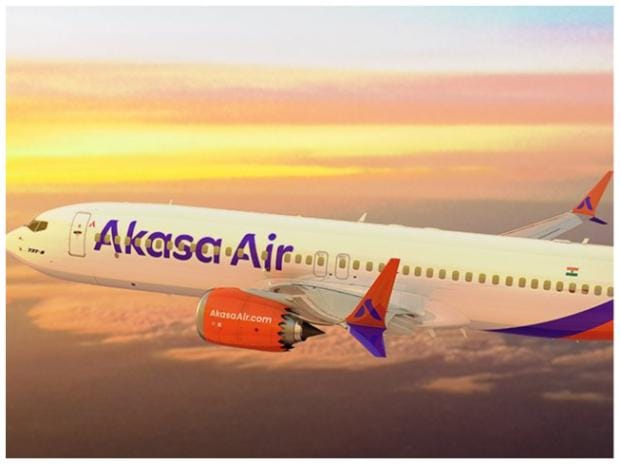No proof of flight cancellations, dismiss Akasa’s petition: DGCA to HC
Akasa Air has not submitted any proof of flight cancellation due to the abrupt resignation of 43 pilots, the Directorate General of Civil Aviation (DGCA) told the Delhi High Court in its affidavit on Friday.
The civil aviation regulator “categorically denied that the Petitioner Company (Akasa Air) has provided any documents or reasons to Respondent No 1 (DGCA) in respect of cancellation of flights as a result of pilots submitting their resignations.”
This is in contrast to Akasa Air’s statement in the Delhi High Court on Tuesday that more than 1000 flights have been cancelled from August 1 to September 19, due to abrupt resignation of 43 pilots.
Akasa had told the court that they have cancelled 24 flights per day and they operate 120 flights per day. This means that there is a cancellation of 20 per cent in a month.
However, the DGCA said that as per the details submitted by Akasa Air, 1.17 per cent of flights were cancelled in the month of August 2023.
The regulator said as per monthly traffic data of the airline, which has details of the flight cancellations owing to technical, commercial, operational, adverse weather conditions, and also on account of miscellaneous reasons, “there is no separate reason for flight cancellations resulting on account of a shortage of pilots.”
The airline had told the court that it is expecting to cancel a total of approximately 600-700 flights in September if the spate of resignations continues. “We have (already) cancelled 600 flights in the month of August,” the airline’s counsel said, requesting the court to empower the Directorate General of Civil Aviation (DGCA) to enforce the rules regarding mandatory notice period.
The DGCA told the court that the rules of mandatory notice period have been challenged in another case that is pending in the same court, “restraining the DGCA from taking any action against the parties.”
It said that the “parties (in employment contract) are free to fix their notice period as per their mutual understanding” and DGCA “has no role to play in the same.”
Counsel for the DGCA, Anjana Gossain, in the last hearing had told the court that the regulator can’t take any action on this matter as the rules — regarding the mandatory notice period — have already been challenged by the pilot unions in an ongoing court case. Pilot unions, who were also present in the court, opposed Akasa Air’s petition stating that the matter regarding the notice period is not a regulatory matter but a contractual matter between the pilot and the airline.
The regulator said it “does not have any power or delegated authority to interfere in any employment contract” and so it cannot interfere in the employment agreement between the airline and the pilot.
Based on the above submissions, the DGCA asked the court to “dismiss the present petition (of Akasa Air) with costs as the case of the petitioner is devoid of any merit.”
“The DGCA cannot interfere in the employment agreement between airline and the pilot, which itself contains the mechanism of termination of pilots, and it would be in the interest of the parties that Petitioner airline (Akasa) complies with the mandate of the answering respondent (DGCA) to maintain a limited schedule if it does not have enough necessary number of pilots to maintain the operations of the flights,” the regulator submitted.
Akasa Air is currently in a “state of crisis” and it “may shut down” due to abrupt resignations by 43 pilots to join rival airlines, the newly-established carrier had told the Delhi High Court on Tuesday.
With Akasa Air sounding an emergency alarm, the Indian aviation sector is undergoing immense turbulence right now. Go First went insolvent in May this year, stating that about half of its 54 planes were grounded due to delay in engine supply by US-based Pratt & Whitney. Go First’s revival is still unsure as its lessors want their planes back and the matter is now in court. SpiceJet, another budget carrier, continues to deal with a cash crunch even as it is dealing with multiple court cases regarding money owed to lessors, former promoter Kalanithi Maran and financial services firm Credit Suisse.
Justice Manmeet Pritam Singh Arora had told DGCA to file their submissions in the case, which was filed on Friday. The court had also allowed two pilot unions — Indian Pilots Guild and Federation Of Indian Pilots — to file their reply. The arguments in the case have been concluded and the judgment is reserved.
At present, Akasa Air maintains a fleet comprising 20 B737 Max aircraft, while Air India Express possesses 26 B737 planes in its fleet.
Air India Express is expecting to receive approximately 50 additional B737 Max planes from Boeing by the end of 2024, and consequently, the airline has been actively recruiting pilots over the past few months. These 50 planes will come from the massive 220-plane order that the Air India Group placed with Boeing in February this year.
According to aviation analytics firm Cirium, this month, Akasa Air is conducting 754 flights weekly, marking an 8 per cent reduction compared to July.
